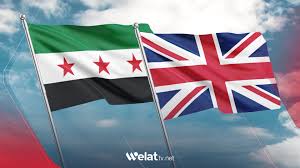In a significant step towards easing economic restrictions on Syria, the United Kingdom announced the removal of 24 entities from its sanctions list, lifting the freeze on their assets under its Syria sanctions regime. The decision aligns with broader international efforts to relax restrictions on Syria following the country’s recent political transition. Among the delisted entities are the Syrian Central Bank, several other financial institutions, and key oil companies.
This move follows a similar decision by the European Union, which recently suspended sanctions on vital economic sectors in Syria, signaling a shift in the international approach towards supporting the country’s recovery.
The UK’s decision comes just a week after the EU suspended certain sanctions targeting Syria’s banking, energy, and transportation sectors. During a meeting in Brussels, the foreign ministers of all 27 EU member states agreed to lift restrictions on several major Syrian financial institutions, including the Industrial Bank, the Popular Credit Bank, the Savings Bank, the Agricultural Cooperative Bank, and Syrian Arab Airlines. Additionally, the EU authorized these entities to regain access to funds and economic resources through the Syrian Central Bank.
These measures are part of an ongoing diplomatic and economic strategy to support Syria’s post-war reconstruction following the fall of the previous regime in December 2024. The easing of sanctions aims to promote stability and accelerate rebuilding efforts in the war-torn country.
Turkey Calls for Complete Sanctions Removal
Amid these developments, Turkey has urged Western nations to fully lift sanctions on Syria, emphasizing that continued restrictions hinder economic recovery. During a bilateral consultation with British officials in Ankara, Turkey stressed the need for an unconditional and complete removal of sanctions to allow financial resources to flow into Syria.
The meeting, which took place on Monday, brought together senior officials from both countries, including Turkey’s Deputy Foreign Minister Nuh Yılmaz and the UK’s Minister of State for the Middle East, North Africa, Afghanistan, and Pakistan, Hamish Falconer.
According to Turkish diplomatic sources, Ankara emphasized that sanctions relief is crucial for:
- Facilitating foreign investment in Syria
- Revitalizing key infrastructure projects
- Ensuring economic stability to support sustainable development
Both sides also discussed security and humanitarian issues in Syria, with Turkey presenting a comprehensive assessment of the country’s current challenges.
Security and Regional Stability Concerns
Beyond economic concerns, Turkey also addressed Syria’s security situation during the meeting. Deputy Minister Yılmaz highlighted the adverse impact of Western sanctions on reconstruction and stabilization efforts, arguing that these restrictions impede essential humanitarian and rebuilding initiatives.
Additionally, Turkey criticized Israel’s repeated violations of Syrian sovereignty, asserting that such actions complicate efforts to restore regional stability. Ankara has consistently called for an end to Israeli airstrikes on Syrian territory, warning that ongoing hostilities only deepen instability.
Western Sanctions Remain a Barrier to Full Recovery
While the EU and UK have eased restrictions, broader Western sanctions—particularly those imposed by the United States—remain in place. These sanctions continue to block international investments, severely limiting Syria’s access to financial resources.
Critical sectors, such as transportation, aviation, and energy, remain under heavy restrictions, preventing Syria from fully engaging in the global economy. The ongoing impact of U.S. sanctions has led to:
- Difficulties in securing reconstruction funds
- A constrained banking sector unable to access international financing
- Limited foreign trade and economic recovery efforts
The easing of sanctions by the UK and EU marks a significant shift in international policy towards Syria, reflecting growing recognition of the need to support the country’s reconstruction. However, the continued enforcement of U.S. sanctions poses a major obstacle to full economic recovery.
As Turkey and other regional actors push for a complete lifting of restrictions, the future of Syria’s economic revival will depend on whether global powers can align their policies to facilitate investment, reconstruction, and long-term stability. The coming months will be critical in shaping Syria’s path forward, as international negotiations continue to redefine the country’s post-war trajectory.
This article was translated and edited by The Syrian Observer. The Syrian Observer has not verified the content of this story. Responsibility for the information and views set out in this article lies entirely with the author.


